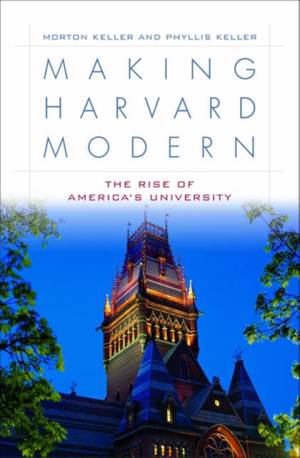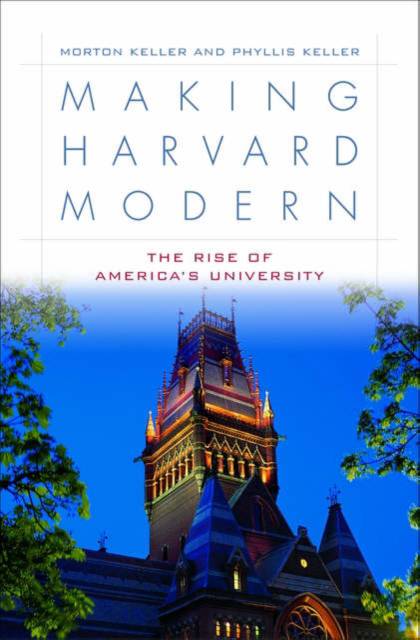
- Retrait gratuit dans votre magasin Club
- 7.000.000 titres dans notre catalogue
- Payer en toute sécurité
- Toujours un magasin près de chez vous
- Retrait gratuit dans votre magasin Club
- 7.000.000 titres dans notre catalogue
- Payer en toute sécurité
- Toujours un magasin près de chez vous
Making Harvard Modern
The Rise of America's University
Morton Keller, Phyllis Keller
Livre relié | Anglais
140,45 €
+ 280 points
Format
Description
Making Harvard Modern is a candid, richly detailed portrait of America's most prominent university from 1933 to the present: seven decades of dramatic change. Early twentieth century Harvard was the country's oldest and richest university, but not necessarily its outstanding one. By the century's end it was widely regarded as the nation's, and the world's, leading institution of higher education. With verve, humor, and insight, Morton and Phyllis Keller tell the story of that rise: a tale of compelling personalities, notable achievement and no less notable academic pratfalls. Their book is based on rich and revealing archival materials, interviews, and personal experience.
Young, humbly born James Bryant Conant succeeded Boston Brahmin A. Lawrence Lowell as Harvard's president in 1933, and set out to change a Brahmin-dominated university into a meritocratic one. He hoped to recruit the nation's finest scholars and an outstanding national student body. But the lack of new money during the Depression and the distractions of World War Two kept Conant, and Harvard, from achieving this goal.
In the 1950s and 1960s, during the presidency of Conant's successor Nathan Marsh Pusey, Harvard raised the money, recruited the faculty, and attracted the students that made it a great meritocratic institution: America's university. The authors provide the fullest account yet of this transformation, and of the wrenching campus crisis of the late 'sixties.
During the last thirty years of the twentieth century, a new academic culture arose: meritocratic Harvard morphed into worldly Harvard. During the presidencies of Derek Bok and Neil Rudenstine the university opened its doors to growing numbers of foreign students, women, African- and Asian-Americans, and Hispanics. Its administration, faculty, and students became more deeply engaged in social issues; its scientists and professional schools were more ready to enter into shared commercial ventures. But worldliness brought its own conflicts: over affirmative action and political correctness, over commercialization, over the ever higher costs of higher education.
This fascinating account, the first comprehensive history of a modern American university, is essential reading for anyone with an interest in the present state and future course of higher education.
Young, humbly born James Bryant Conant succeeded Boston Brahmin A. Lawrence Lowell as Harvard's president in 1933, and set out to change a Brahmin-dominated university into a meritocratic one. He hoped to recruit the nation's finest scholars and an outstanding national student body. But the lack of new money during the Depression and the distractions of World War Two kept Conant, and Harvard, from achieving this goal.
In the 1950s and 1960s, during the presidency of Conant's successor Nathan Marsh Pusey, Harvard raised the money, recruited the faculty, and attracted the students that made it a great meritocratic institution: America's university. The authors provide the fullest account yet of this transformation, and of the wrenching campus crisis of the late 'sixties.
During the last thirty years of the twentieth century, a new academic culture arose: meritocratic Harvard morphed into worldly Harvard. During the presidencies of Derek Bok and Neil Rudenstine the university opened its doors to growing numbers of foreign students, women, African- and Asian-Americans, and Hispanics. Its administration, faculty, and students became more deeply engaged in social issues; its scientists and professional schools were more ready to enter into shared commercial ventures. But worldliness brought its own conflicts: over affirmative action and political correctness, over commercialization, over the ever higher costs of higher education.
This fascinating account, the first comprehensive history of a modern American university, is essential reading for anyone with an interest in the present state and future course of higher education.
Spécifications
Parties prenantes
- Auteur(s) :
- Editeur:
Contenu
- Nombre de pages :
- 608
- Langue:
- Anglais
Caractéristiques
- EAN:
- 9780195144574
- Date de parution :
- 15-11-01
- Format:
- Livre relié
- Format numérique:
- Genaaid
- Dimensions :
- 165 mm x 244 mm
- Poids :
- 1052 g







